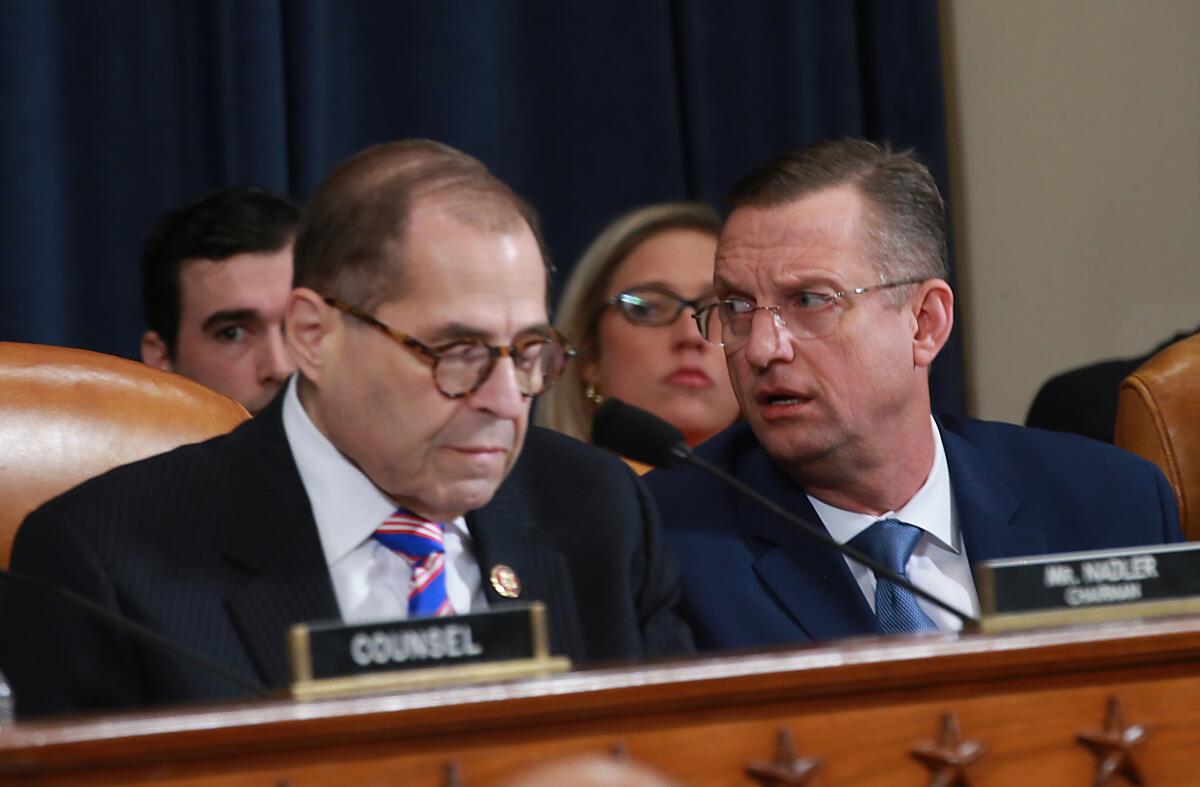Newsletter: Trump will survive because Congress is broken

- Share via
Good morning. I’m Paul Thornton, and it is Saturday, Dec. 7, 2019 — exactly 78 years after the “date which will live in infamy.” Let’s take a look back at the week in Opinion.
Throughout the House impeachment inquiry, I’ve reflected on a question asked frequently these past three years: Will the institutions built by well-meaning political leaders over the centuries withstand the presidency of Donald Trump? The testimonies of current and former nonpartisan experts in the executive branch attest to the resiliency of the American system, one built from the work of career public servants who know they serve the interests of a nation, not any single president. That provides reason to hope.
A cure for the common opinion
Get thought-provoking perspectives with our weekly newsletter.
You may occasionally receive promotional content from the Los Angeles Times.
And yet, in the face of unvarying accounts of the president’s self-dealing on Ukraine and his corrupting of a corner of our diplomatic corps, one institution in particular shows signs of grave weakness: Congress, the most important American institution of them all. Consider that while the facts of Trump’s impeachable conduct are not in serious dispute, what does remain to be seen is whether members of Congress — more precisely, Republican members of Congress — care enough to act or even acknowledge the impropriety of his behavior.
This sad reality was made more apparent by Ken Gormley in his L.A. Times op-ed piece, “Don’t impeach Trump. Censure him.” Gormley concedes that Trump’s conduct “falls squarely within the zone of impeachable offenses imagined by Alexander Hamilton and other framers,” but his argument for censure in lieu of the remedy explicitly laid out in the Constitution is an indirect way of saying the enforcement mechanism for impeachment is broken. That mechanism is Congress.
In a fairer world, a piece like columnist Virginia Heffernan’s “Trump’s impeachment should be the simplest in American history” would reflect reality.
If impeachment and 2020 don’t stop Trump, nothing will. Can you imagine a world in which Trump is not removed from office and reelected by the electoral college? That’s a question asked by editorial writer Scott Martelle, who envisions a frightening reality: “By reelecting Trump, the people will have given their assent to serial abuse of power by a man who may be the least qualified person to have ever served as president of the United States.” L.A. Times
More on impeachment, because there’s a lot: The GOP’s latest defense of Trump actually makes him look worse, says Jon Healey. No, impeachment doesn’t require a criminal act, writes constitutional scholar Erwin Chemerinsky. The Judiciary Committee’s hearing with four law professors wasn’t actually a hearing, Healey writes. And USC English professor Leo Braudy says Trump can learn an important lesson from England’s King Charles I, who was deposed and executed after feuding unceasingly with Parliament.
Kamala Harris will not be president, at least not starting in 2021, and some campaign post-mortems from the national news media are trying to make sense of the former top contender’s rapid fall. There’s this piece in the New York Times: “As we write eulogies of this once promising campaign, which ended on Tuesday, it is important that we talk about more than just personal failings by Ms. Harris and her staff members. We need to talk also about what campaigning looks like for black women and what challenges and hurdles the Harris campaign laid bare. There are biases and structural disadvantages that can be found in the subtle ways the media and the public responded to her candidacy.” New York Times
Some of us in California aren’t surprised by Harris’ descent. We’ve followed her here, first as the San Francisco district attorney and then the state attorney general, so while her record in the Senate was thin and therefore promising in the same way Barack Obama’s was, she’s long given many in California reason to be ambivalent. Jon Healey writes: “I’ve been covering Harris since her first run for California attorney general, and she’s impressed me as sharp and persuasive. But she’s also struck me as a cautious politician, someone unwilling to wage fights that could alienate supporters.” L.A. Times
What do Devin Nunes’ constituents think of him? The way Trump’s ardent defender on the House Intelligence Committee behaves, you’d think his Central Valley seat was safe for the Republican. Truth is, Nunes’ last Democratic opponent came tantalizingly close to defeating him, and many locals regard their representative as an absent politician who shows up only at election time. Read columnist Robin Abcarian’s dispatch from Nunes country. L.A. Times
Now that we got those out of the way, this is where I ask you to consider subscribing to the L.A. Times’ other great newsletters. Much of the opinion journalism here is informed by the reporting of the L.A. Times’ news team, which is featured in many of our daily newsletters. Click here for more information on those options.
And, if there’s anything I can do to improve this newsletter, let me know. Reach me at paul.thornton@latimes.com
More to Read
A cure for the common opinion
Get thought-provoking perspectives with our weekly newsletter.
You may occasionally receive promotional content from the Los Angeles Times.







